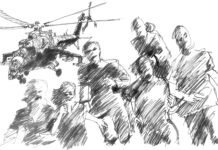Chapter 7: Lies to truth
The fantasy continues..
“Did you really think you were creating lies?”
Tommy thought about it. “No, I wasn’t that self-aware.”
Tommy—mostly out of daily Overture activity now, but still engaged in issues regarding consensus within the co-op—reflected on the question.
To Brie: “We were on fire with the power of it all. Caught up in the self-romance. Intoxicated with being advisers to the princesses and kings of the world. Flying the world in first. Or better yet, corporate jets.
“
Striding into the domains of corporate chieftains past multi-million-dollar art collections and designer furnishings. Speaking a truth that promised the kings of capitalism and their minions market dominance. We called it ‘brand power.’ Offering up the secrets of mass market control that only the prophets of brand power could deliver from on high.
“We never thought about the lies. We thought about the minutia of emotional benefits and supporting functionality. We devised houses of brands and branded houses. We lusted after those moments when the powerful and the rich would gaze upon us and our beautiful brand graphics with awe.
The money was good, too. But to tell you the truth, I never thought about the money. At least I never thought about it after negotiating the deal.
The deal
“Looking back, making the deal was the best part. Of course, I was mostly traumatized. Traumatized because of the fear, but oh so focused. Focused on every nuance of the deal. Alive with the grip of it. I’m sure that’s why I remember the details so sharply. How the room looked. The smells. The furniture. The face of their lead negotiator, all imprinted on my memory… forever.
‘Once the deal was done, or maybe not done but moving our way… then I’d lighten up. Relax a bit. Move into the enjoyment of the status that came with guiding the client through to owning the concept.
“‘Cash was king,’ our CFO liked to say. And as a cash flow business, that was true. But it was concepts that drove the cash.
“Concepts are well-argued ideas. Ideas that grab the imagination of corporate kings. Ideas that can be wheeled like a lance one minute and a shield the next.”
Wait a minute
Brie stopped Tommy’s recitation of the glorious victories on the field of branding honor.
“But, Tommy! That’s not you. You dove into building Overture, a co-op dedicated to enlisting the power of creativity for a better world.”
“Yes I did. But you must remember that, even in my days of supreme ego gratification, I took great pride in securing challenging, interesting work for our creative team and paying them well.
“I now know that it was impossible for me to escape my egalitarian roots. Recycling, worker representation, collective bargaining. Fairness, level playing field, public education. These were deep within me. Impossible to shake. But I didn’t know how to access them in my pursuit of survival and ultimately success.
“Yes, I believed in the goodness of capitalism during those years and the American myth that anyone could get ahead with dedication and hard work. Then my role changed, and I spent years inside the corporate curtain and saw first hand the damage being done to people and the planet with the overriding goal of capital accumulation. And I learned that hard work and dedication wasn’t the formula for success. It’s much easier than that. You just need to arrange to be born in the right zip code.”
Brie stopped him again with…
“Tommy, I want you to talk with Allison. She’s doing that piece I mentioned for the Times. But with the riots, she has widened the scope of the piece.”
Rescue
It was with relief to all when the drones located and picked up Allison and Brie. They were on a roof top with what appeared to be an armed mercenary band clambering up the stairs of their high-rise when they were plucked away.
Safely in the Beacon Hill hideaway, Allison continued the interview.
“Brie, I still don’t get how the founders moved from design and branding to organizational change and now General Motors as a client.”
“Right, yes it seems like an improbable leap. I think you should talk to the founders. I’ll set something up.”
Mass social
The result of 100,000 GM employees being free to discuss everything about GM on social was transformative. Shareholders were outraged, of course. Customers were curious and, quite naturally, engaged. Management was torn. Most of management from line managers to the most senior levels were long-term GM employees. Hard for them to move into this new world of empowered employees. After all, only the very top, “C” level and the board had changed.
No one had seen anything like this.
It was Overture that recommended to the board that every employee’s voice be heard. Why? Because the Overture team had learned that you can’t drive change from the top down. It must be bottom up. Usually the top resists real change because change threatens their sweet deal. But here the board and the “C” suite were leading the change. Even so, the workforce must be released to believe in and engage in the change. Years of corporate greed and mistreated workers build a culture of mistrust that’s not easy to change.
Reskin—or get real?
In the old days, Tommy and the brand team would change the logo, the slogan and make everybody sing the jingle under threat of job loss—reskinning the corporation to hide the lies and excess.
The Overture founders had learned that the branding that fueled capitalism contributed to the endless production of inequality and that capitalism itself was essentially unjust and unstable. Unstable in a way that created massive job loss every 10 years or so. Income loss for the poor and the middle, never the top. Hence the current unrest.
Overture’s General Motors’ bet was that a completely new board and newly hired senior management, along with the very public drop of salaries of management and the creation of a employee stock program, signaled that things were changing for the better. Everyone also knew that, with the attacks on airlines, the complete shutdown of public air travel and GM’s shift to designing and producing mass transit, change was happening. That it was big. That it was real. If the workers didn’t get in and support it, the opportunity for them to be involved in lasting change could slip away.
Overture’s social team also knew that the messages people trust most from corporations are those from employees. People don’t trust logos and celebrity CEO’s. They trust people. A massive out flowing of messages from GM captured the imaginations of all. Even if some of the messages were negative, and why wouldn’t they be? The company had been screwing employees for years. The massive out pouring alone would proclaim that this company was changing. And the change was radical.
Change was now possible
The old GM board and their hand-picked chieftains, along with their excessive compensation, were gone. Swept away with their inability to maintain the massive profits and the rising social unrest that threatened their lives.
Activist shareholders with the largest holdings took advantage of the moment and organized the board’s dismissal. The new board was dedicated to saving the immense GM infrastructure and the massive well of talent that was the essence of the company.
With every GM employee charged with helping to describe the future of the company, 100,000 voices are engaged in finding what will be in the best interests of all.
This could become real.






